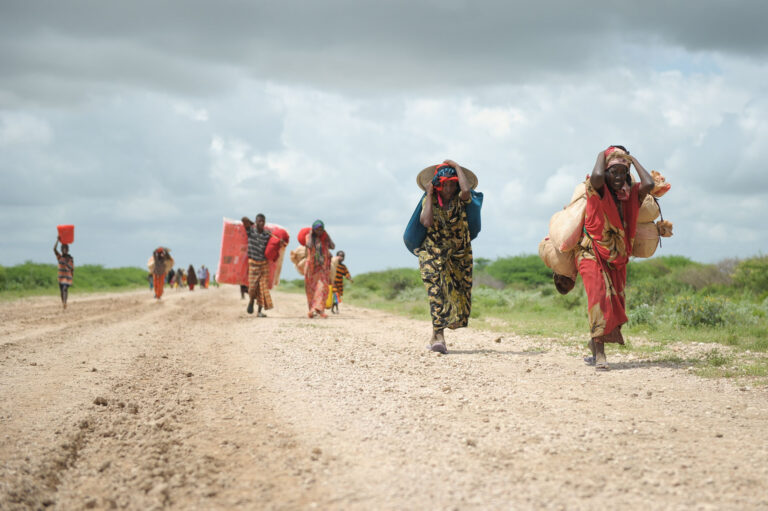Climate change presents a range of scientific, technical, and economic challenges. Human rights principles play a key and complementary role in identifying and addressing these challenges. A focus on human rights can help direct solutions for the problems that matter most to human beings, while ensuring that steps taken to mitigate or adapt to climate change are themselves consistent with human rights.
Climate change is already having a devastating impact on basic rights to water, food, health, adequate housing, education — and even the right to life. In the Horn of Africa, millions face a lack of water and food due to devastating droughts caused by changes in rainfall patterns. Rising sea levels are increasingly leading to salinization of water supplies, erosion, and flooding, depriving coastal communities around the world of their land, livelihoods, and access to drinkable water. Extreme heat is increasingly common, leading to heat exhaustion, heat stroke, and large numbers of deaths for those unable to escape the heat. Extreme heat also affects peoples’ ability to earn a livelihood or attend school.
A human rights perspective can translate abstract concepts, such as acceptable CO₂ levels and the difference between a rise of 1.5°C versus 2.0°C above pre-industrial levels, into tangible consequences for humans. This is critical for generating public and political support for the huge shifts in industry and investments needed to facilitate serious efforts at mitigation which, until now, have been characterized by failed commitments and greenwashing by governments and companies alike.
A human rights perspective can also assist in successful advocacy for a sufficient allocation of resources for adaptation initiatives that will reduce the adverse impacts of climate change on individuals and communities. According to the most recent report by the Intergovernmental Panel on Climate Change, between 3.3 and 3.6 billion people live in areas “highly vulnerable to climate change,” with “additional severe risks” should the earth warm beyond 1.5°C above pre-industrial levels. Yet the $100 billion climate fund agreed by the Conference of Parties in 2009 is still woefully underfunded and, because much of the funding is in the form of loans instead of grants, is even having the perverse consequence of increasing indebtedness in many poor countries.
Climate change presents a truly global challenge. Action to combat its destructive impacts will similarly require a global commitment. To be most effective, those actions will need to adhere to international human rights principles. The Preamble to the Paris Agreement, which was signed by 196 countries, was clear:
Acknowledging that climate change is a common concern of humankind, Parties should, when taking action to address climate change, respect, promote and consider their respective obligations on human rights, the right to health, the rights of indigenous peoples, local communities, migrants, children, persons with
disabilities and people in vulnerable situations and the right to development, as well as gender equality, empowerment of women and intergenerational equity.
Key international human rights treaties include:
- the International Covenant on Civil and Political Rights (ICCPR),
- the International Covenant on Economic, Social and Cultural Rights (ICESCR),
- the Convention of the Rights of the Child (CRC),
- the Convention on the Elimination of All Forms of Discrimination Against Women (CEDAW),
- the Convention on the Rights of Persons with Disabilities (CRPD),
- the International Convention on the Elimination of all forms of Discrimination ICERD),
- the Convention Relating to the Status of Refugees, and
- the Convention on the Protection of the Rights of All Migrant Workers and Members of their Families.
By becoming party to any of these treaties, countries have committed to refrain from violating the specified rights and to protect people from the violation of those rights by third parties. The Universal Declaration of Human Rights, while not a treaty, also expresses the full range of human rights, and many aspects of the Declaration are considered to be customary international law.
Almost all of the key international human rights treaties were adopted before the potentially catastrophic impact of climate change on humans and their rights was appreciated. But the U.N. General Assembly, the U.N. Human Rights Committee, and many of the treaty bodies and U.N. special rapporteurs charged with commenting on these treaties or on specific issues related to human rights have made increasingly strong statements about the obligation of states to protect the rights set forth in these treaties from the foreseeable adverse impacts of climate change.
By documenting climate-related human rights violations, engaging in high-level advocacy, and using all forms of media to hold abusers accountable, Climate Rights International will pressure governments, international organizations, and businesses to live up to that clear and compelling objective.
Photo Credit: Women, walking with what possessions they can carry, arrive in a steady trickle at an IDP camp near the town of Jowhar, Somalia. Heavy rains in Somalia have resulted in thousands of Internally Displaced Persons (IDPs). Photo by Tobin Jones (CC0 1.0)







